<< Previous | Displaying results 4091-4100 of 6776 for "" | Next >>

Signs excluding Jews, such as the sign shown here, were posted in public places (including parks, theaters, movie houses, and restaurants) throughout Nazi Germany. This sign states in German: "Jews are not wanted here."
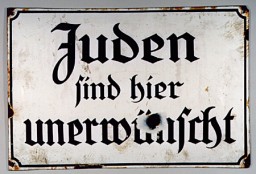
1939 flyer from the Hotel Reichshof in Hamburg, Germany. The red tag informed Jewish guests of the hotel that they were not permitted in the hotel restaurant, bar, or in the reception rooms. The hotel management required Jewish guests to take their meals in their rooms. Following the Nuremberg Laws of 1935, Jews were systematically excluded from public places in Germany.
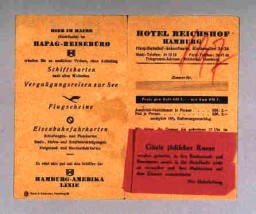
Antisemitic children's book published in 1936 in Nuremberg, Germany. The title, in German, is translated as "You Can't Trust a Fox in the Heath and a Jew on his Oath: A Picture Book for Young and Old." The cover depicts a fox in the heath and a caricature of a Jew taking an oath.
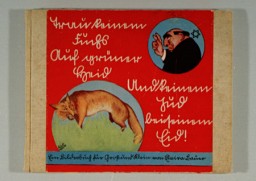
Yona Wygocka Dickmann fashioned this aluminum comb from airplane parts after the SS transferred her from Auschwitz to forced labor in an airplane factory in Freiburg, Germany, in November 1944. She used the comb as her hair, shaven in Auschwitz, began to grow back.
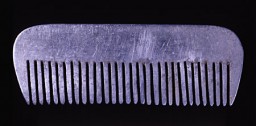
These Torah scrolls, one from a synagogue in Vienna and the other from Marburg, were desecrated during Kristallnacht (the "Night of Broken Glass"), the violent anti-Jewish pogrom of November 9 and 10, 1938. The pogrom occurred throughout Germany, which by then included both Austria and the Sudetenland region of Czechoslovakia. The scrolls pictured here were retrieved by German individuals and safeguarded until after the war.
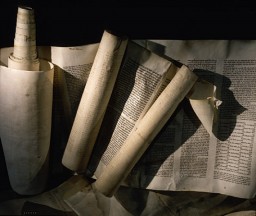
The pages photographed here are from Hebrew prayer books destroyed during the Kristallnacht ("Night of Broken Glass") pogrom of November 9 and 10, 1938. These pages were damaged by fire during the destruction of the synagogue in Bobenhausen, Germany. The Jewish community of Giessen donated them to the United States Holocaust Memorial Museum in 1989.
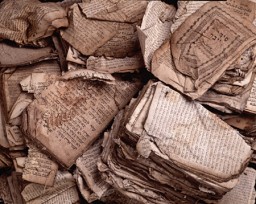
The family bible shown here belonged to Andre Trocme and contains annotations he made in preparation for his sermons. Trocme was a Protestant pastor in Le Chambon-sur-Lignon, France. During the war, he and the town's residents helped shield Jews, especially Jewish children, and others from the Germans. The operation saved thousands of refugees, including about 5,000 Jews. His handwritten inscription in French reads, in part, "Happy are those hungry and thirsty of justice; for they will be satisfied."
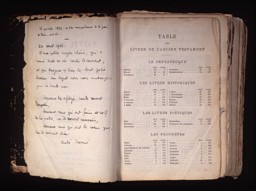
Document from the Buchenwald trial stating that both the prosecution and the defense teams agree to waive their right to make closing statements. The document is signed by the US military prosecutors (including William Denson), the defense lawyers, and the defendants. Dachau, Germany, August 8, 1947.
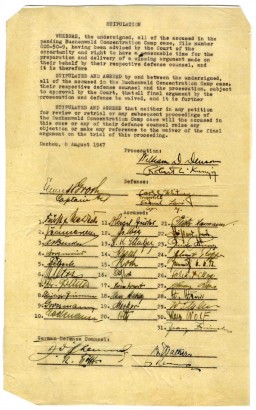
This election poster calls on Germans to vote in support of Hitler's hand-picked candidates to the Reichstag (the German parliament). The poster details Hitler's actions and reads, in part: 'In 8 months two and a quarter million Germans have work and bread again! Class warfare and its parties are eliminated! The Bolsheviks are smashed. Particularism is overcome! A Reich of order and cleanliness is established. One People. One Reich. One Leader. This is what Hitler has accomplished..."
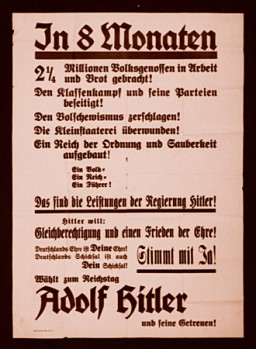
We would like to thank Crown Family Philanthropies, Abe and Ida Cooper Foundation, the Claims Conference, EVZ, and BMF for supporting the ongoing work to create content and resources for the Holocaust Encyclopedia. View the list of donor acknowledgement.